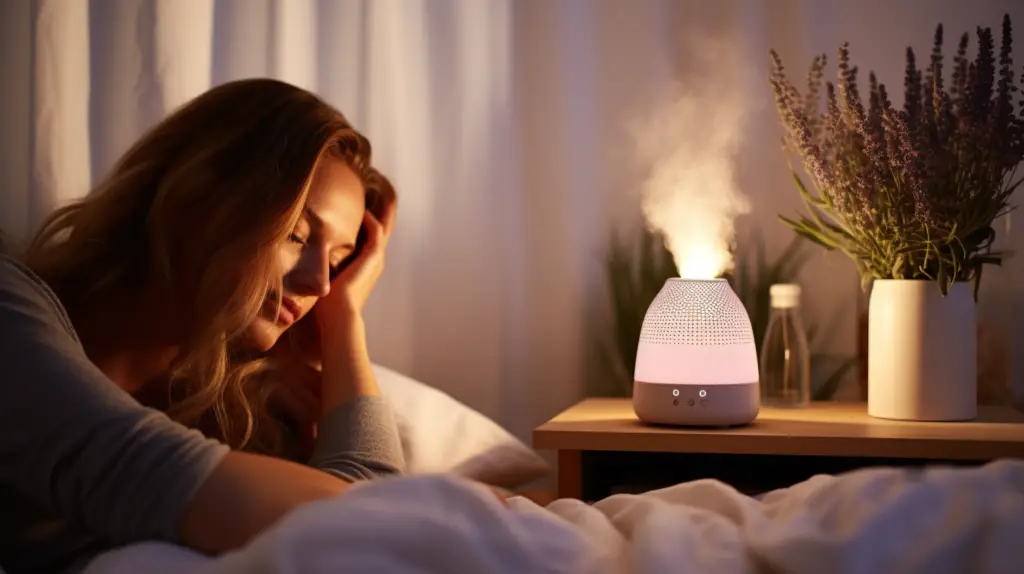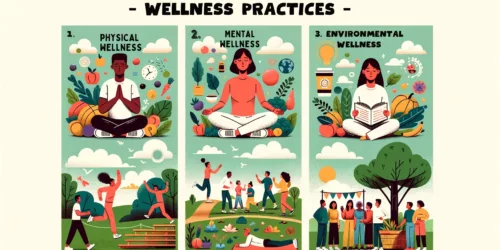Wellness Practices for Sleep

We’ve all done it: stayed up late, run on too little sleep then wondered why we feel so sluggish the next day!
Sleep is an essential part of our overall health and wellbeing, yet many of us struggle to get a good night’s rest.
Thankfully, there are a variety of wellness practices for sleep that can help us get the quality rest we need.
From developing a bedtime routine to managing stress and anxiety, let’s explore how we can cultivate better sleeping habits.
Key Takeaways
- Establish a consistent bedtime routine and create a comfortable sleep environment
- Practice healthy sleep hygiene habits and reduce blue light exposure before bedtime
- Engage in mindfulness techniques such as meditation and breathing exercises to promote relaxation and reduce stress
- Seek professional help and individualized approaches, such as cognitive behavioral therapy or sleep tracking, to address insomnia and improve sleep quality
Benefits of Sleep
Getting enough sleep has many benefits for your physical and mental health. A good night’s rest can help reduce stress, boost energy levels, enhance concentration, and improve moods.
It also helps to regulate hormones and support the immune system. Medication effects can be minimized when proper sleep is achieved. Lifestyle changes such as limiting caffeine intake or avoiding late-night snacks may also be necessary to achieve a good night’s rest.
Developing healthy sleep habits is essential in order to experience the full benefits of sleep – so let’s take a look at how to make sure you get enough quality shut-eye each night!
Good Sleep Habits And Wellness Practices for Sleep
We all know how important getting enough sleep is to our overall health and wellbeing.
To ensure that we get the best possible rest, it’s important to develop good sleep habits. These include establishing a consistent bedtime routine, creating a comfortable sleep environment, and following healthy ‘sleep hygiene’ practices.
Bedtime Routines
Having a consistent bedtime routine can help improve sleep quality. We recommend reducing blue light exposure, journaling before bed, and making sure to get enough exercise during the day.
- Cut back on screens an hour before bedtime: dimming the brightness of our devices and avoiding anything that emits blue light.
- Journaling about life events or writing down thoughts can be a great way to clear our minds and relax before going to sleep.
- Making sure we get enough physical activity during the day can help make it easier for us to fall asleep at night and stay asleep longer.
A good bedtime routine helps us unwind from our day, allowing us to have better restful nights and wake up feeling more energized in the morning.
Sleep Environment
Creating a comfortable sleep environment is key to getting restful sleep. We recommend making sure your room is dark, quiet, and cool.
Blackout curtains and eye masks are great tools for blocking out any ambient light that can disrupt your slumber. Noise reduction can be achieved with the use of ear plugs or white noise machines.
Additionally, it’s important to keep the temperature in your bedroom cool; aim for 60-67 degrees Fahrenheit (16-19 degrees Celsius).
Taking these steps will help ensure you achieve a quality night’s sleep and incroporate Wellness Practices for Sleep.
Sleep Hygiene
Maintaining good sleep hygiene is essential for getting quality rest. Here are a few tips to help you get the best out of your sleep routine:
- Keep regular bedtimes and wake times: Aim to go to bed and wake up at the same time every day, even on weekends.
- Develop a relaxing bedtime routine: Take an hour before bed to unwind with activities such as reading, stretching, or meditating.
- Try digital detoxes and workplace naps: To ensure uninterrupted sleep at night, practice digital detoxes throughout the day and take workplace naps when possible.
These practices can help establish healthy habits that promote better sleeping patterns so you can more easily relax into deep slumber each night.
Developing a Bedtime Routine
Developing a consistent bedtime routine can help you get the restful sleep you need. Creating rituals that are calming and non-stimulating can help to relax your body and mind before bed.
Avoid using electronics within an hour of going to bed, as the bright light from these devices can keep your brain alert when it should be winding down.
Incorporate activities such as taking a warm bath or shower, listening to soothing music, reading a book, or meditating into your pre-bedtime routine to help transition into sleep mode.
Practicing these habits regularly will also provide consistency in preparing for restful nights of sleep.
Setting the Sleep Environment
Setting up a comfortable sleep environment can help you get the restful sleep you need. Consider:
- Darkening your curtains to reduce light and noise pollution coming from outside.
- Keeping adjustable temperatures in your bedroom, so it’s not too hot or cold when you get in bed.
- Making sure all electronics are off before bedtime, as their blue light can disrupt melatonin production.
Creating an ideal sleep atmosphere will help promote good sleeping habits and provide a restful night’s sleep.
It doesn’t take much to make small changes that have a big impact on your overall wellbeing!
Optimizing Your Diet for Sleep
We’re here to talk about optimizing your diet for sleep.
This includes nutrient timing and food choices.
Let’s look at how we can use these two elements to ensure we get the restful night of sleep that we deserve.
Nutrient Timing
Properly timing your nutrient intake can help improve your sleep. Supplementation timing and dietary patterns are key to achieving this. Here are three tips to keep in mind:
- Eat earlier in the day and avoid late night snacking as it can make it harder for you to fall asleep.
- Incorporate more magnesium-rich foods, like nuts and legumes, into your diet as this mineral helps promote relaxation, which is necessary for a good night’s rest.
- Avoid sugary drinks or food right before bedtime as they can cause an energy spike that will disrupt your sleep cycle.
Following these simple tips will ensure you get the proper nutrients at the right time to maximize restful sleep every night.
Food Choices
Making healthy food choices can help you get the restful sleep you need. Eating a balanced diet with plenty of fruits, vegetables, and whole grains is important for good sleep hygiene. Choosing snacks that are low in sugar and caffeine can help reduce feelings of restlessness from too much stimulation. It’s also important to limit late night meals as well as nighttime snacks that are high in fat or sugar. Caffeine consumption should be limited to earlier parts of the day as it may interfere with sleep patterns if consumed too close to bedtime.
| Foods | Benefits | Avoid |
|---|---|---|
| Fruits & Veggies | Nutrients & Antioxidants | High Sugar Content |
| Whole Grains | Balanced Diet & Energy Boosts | Refined Grains & Sugars |
| Low-Sugar Snacks | Reduced Stimulation Levels | Caffeine & Fatty Snacks |
| Limiting Late Night Meals & Snacks | Reduced Sleep Interference | Caffeine Consumption |
Incorporating Exercise Into Your Day
Incorporating exercise into your day can help you get better sleep. Regular physical activity is beneficial for so many reasons, from increasing energy levels to boosting mental health – all of which contribute to better sleep.
Here are a few ways to incorporate more exercise into your routine:
- Take a brisk walk in the morning or evening
- Try yoga or tai chi for relaxation techniques
- Take up an enjoyable hobby like dancing or cycling
Exercising regularly can also help manage stress and anxiety, both of which can interfere with getting enough restful sleep.
Managing Stress and Anxiety
Managing stress and anxiety can have a huge impact on your overall wellbeing, so it’s important to find ways to reduce them.
| Activity | Benefits |
|---|---|
| Managing distractions | Improved focus and concentration |
| Balancing workloads | Reduced pressure and strain |
| Practicing mindfulness | Increased awareness of thoughts and feelings |
Taking the time to practice mindfulness can help you better understand how stress affects you, leading to better sleep.
Practicing Mindfulness for Better Sleep
Taking a few moments to focus on your breath and thoughts can help you get better sleep. Practicing mindfulness can be an effective way to reduce stress, improve relaxation, and ultimately make it easier to fall asleep.
Here are a few simple ways to incorporate this practice into your life:
- Experiment with different meditation techniques – try guided imagery or progressive muscle relaxation exercises.
- Take a few moments each day to check in with yourself – notice how you’re feeling mentally and physically, then take some slow breaths.
- Incorporate mindful movements like yoga or Tai Chi into your day – these activities will help you connect body and mind for improved relaxation.
Seeking Professional Help for Insomnia
As a supplement to practicing mindfulness for better sleep, seeking professional help for insomnia can be an effective option. Alternative treatments such as cognitive behavioral therapy (CBT) and prescription medications may provide relief if the problem persists. It’s important to remember that these treatments should always be discussed with your doctor before exploring any further.
If you’re looking for additional tools to track your sleep patterns, many apps are now available that can help identify potential root causes of sleeplessness and suggest solutions. Remember, there is no one-size-fits-all solution when it comes to improving sleep quality – what works for some may not work for others.
Taking action now by talking to your healthcare provider about alternative treatments or using sleep tracking technology could ultimately lead to more restful nights in the future.
Frequently Asked Questions on Wellness Practices for Sleep
How Much Sleep Should I Be Getting Each Night?
We should aim for 7-9 hours of sleep each night. To help achieve this, consider melatonin supplementation and blocking blue light exposure before bedtime. This will promote better quality rest and improved wellness.
What Are Some Natural Remedies for Sleep Problems?
We’ve all struggled with sleep problems at some point. To help, try herbal teas and good sleep hygiene habits like avoiding screens before bed. These natural remedies can make a big difference!
What Are the Long-Term Consequences of Not Getting Enough Sleep?
We’re like zombies without enough sleep! Not getting enough can reduce our ability to cope with stress, and be impacted by environmental factors. Long-term consequences include decreased concentration, worsened moods, increased risk of injury and illness, difficulty making decisions, and even weight gain. Take care of yourself – get some rest!
Are There Any Apps or Technology That Can Help With Sleep?
We’re looking for apps or tech that can help with sleep. A great place to start is by setting up a bedtime routine and tracking your sleep patterns. There are plenty of apps available that can help you do both! They can provide insight into how well you’re sleeping, so you can make adjustments as needed.
What Should I Do if I’m Having Trouble Falling Asleep?
We have trouble falling asleep sometimes. To help, create an exercise routine and establish a consistent bedtime routine. Take the time to wind down before bed, such as reading or stretching. Doing this regularly can make it easier to drift off when you hit the pillow.
Conclusion : Wellness Practices for Sleep
We’ve learned a lot about how to get better sleep with these wellness practices.
From developing a bedtime routine and setting the perfect sleep environment, to optimizing our diets and managing stress, we can take control of our sleep health.
With these tips in mind, we can transform ourselves into sleeping champions – no exaggeration!
We feel more energized and ready to take on life’s challenges knowing that every night is filled with restful, healing slumber.






